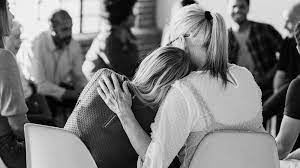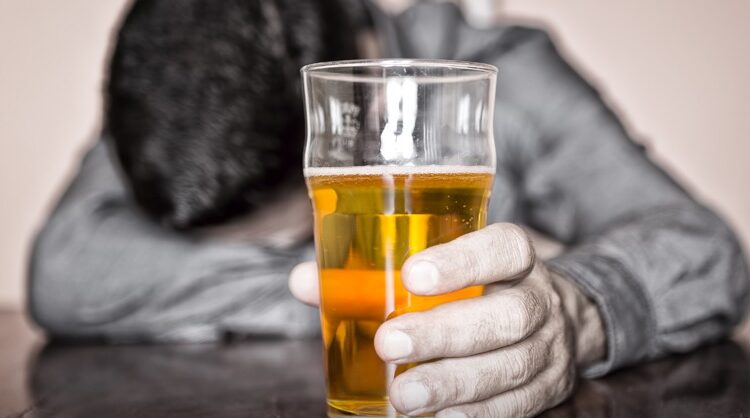Bipolar disorder and alcoholism often coexist. In fact, it is estimated that about 50% of people who have bipolar disorder also have an alcohol use disorder. This can be a dangerous combination, as bipolar disorder and alcoholism can both lead to risky behaviors. It is important to know the signs and symptoms of each condition, so you can get help if needed. In this blog post, we will discuss the link between bipolar disorder and alcoholism, as well as the signs and symptoms of each condition.
Contents
What Are Bipolar And Alcoholism?
 Bipolar and alcoholism are very dangerous combinations. Alcoholism is a serious problem on its own, but when you add bipolar disorder to the mix, it can become life-threatening.
Bipolar and alcoholism are very dangerous combinations. Alcoholism is a serious problem on its own, but when you add bipolar disorder to the mix, it can become life-threatening.
Bipolar disorder is a mental illness that causes extreme mood swings. These swings can range from feeling extremely happy and energized to feeling completely depressed and hopeless. People with bipolar disorder often have periods where they feel like they can’t control their emotions.
Alcoholism is a disease that causes people to compulsively drink alcohol, even when it’s harmful to their health. Alcoholics often have trouble stopping once they start drinking and may need to drink more and more to get the same effect.
Bipolar and alcoholism often go hand in hand because alcohol can be used as a way to self-medicate. When people are feeling low, they may turn to alcohol to try and make themselves feel better. However, drinking alcohol only aggravates the symptoms of bipolar disorder and can lead to dangerous consequences.
What Is The Link Between Bipolar And Alcoholism?
There is a strong link between bipolar disorder and alcoholism. According to the National Institute on Alcohol Abuse and Alcoholism, about 50% of people with bipolar disorder also have an alcohol use disorder.
In fact, bipolar and alcoholism can be a dangerous combination. People with bipolar disorder who drink alcohol are more likely to:
- Have more severe symptoms of bipolar disorder
- Be hospitalized for manic episodes
- Develop a substance use disorder
- Attempt suicide
More often, both conditions share some common similarities and even differences. Let’s discuss some of those in more detail.
Similarities
 Both bipolar disorder and alcoholism are characterized by mood swings. People with bipolar disorder experience extreme highs and lows, known as mania and depression. During a manic episode, people may feel euphoric and have lots of energy.
Both bipolar disorder and alcoholism are characterized by mood swings. People with bipolar disorder experience extreme highs and lows, known as mania and depression. During a manic episode, people may feel euphoric and have lots of energy.
They may also act impulsively and make poor decisions, like spending too much money or having risky sex. During a depressive episode, people may feel hopeless and worthless. They may also have very little energy and trouble sleeping.
In fact, both share some common risk factors. For example, both conditions are more likely to develop in people who have a family history of the disorder or addiction. Additionally, people with bipolar disorder may self-medicate with alcohol to ease their symptoms.
Differences
Bipolar disorder and alcoholism also have some key differences. For instance, bipolar disorder is a mental illness that is characterized by extreme mood swings. These mood swings can range from periods of extreme happiness, known as mania, to periods of deep depression.
Alcoholism, on the other hand, is a chronic disease that is characterized by an addiction to alcohol. While people with bipolar disorder may go through periods where they abuse alcohol, it is not considered to be a defining characteristic of the disorder.
It’s also important to note that bipolar disorder and alcoholism can occur independently of one another. That is, you can have bipolar disorder without having an addiction to alcohol, and you can be an alcoholic without having bipolar disorder.
So these are some common similarities and differences between bipolar disorder and alcoholism. If you or someone you know is struggling with either of these conditions, it’s important to seek professional help.
How Do Bipolar And Alcoholism Affect Life?
 There are many ways that bipolar and alcoholism can affect someone’s life. The most obvious way is through the person’s moods. When someone is bipolar, they experience extreme highs and lows in their mood. This can make it very difficult to function in day-to-day life. Some of the consequences are:
There are many ways that bipolar and alcoholism can affect someone’s life. The most obvious way is through the person’s moods. When someone is bipolar, they experience extreme highs and lows in their mood. This can make it very difficult to function in day-to-day life. Some of the consequences are:
Difficulty keeping a job
This is one of the most common consequences of bipolar and alcoholism. The person’s mood swings can make it very difficult to keep a job. They may be able to hold down a job for a short period of time, but eventually, their employer will catch on and they will be let go. In fact, many employers are not willing to hire someone with bipolar disorder because of the potential liability.
Trouble maintaining relationships
When bipolar and alcoholism are present, it can be very difficult to maintain relationships. The person may have difficulty keeping a job, which can lead to financial problems. This can put a strain on their relationship with their partner. They may also have difficulty communicating with their partner and may end up in arguments more often than not.
Isolation
Another common consequence of bipolar and alcoholism is isolation. The person may start to withdraw from their friends and family. They may stop going out and participating in activities that they used to enjoy. This can lead to further isolation and depression. For example, the person may start to drink alcohol more often because they are feeling isolated.
Financial problems
This is one of the obvious consequences of bipolar and alcoholism. The person may have difficulty keeping a job, which can lead to financial problems. They may also have to spend more money on alcohol than they can afford. This can lead to debt and even homelessness.
Health problems
When you are bipolar and alcoholic, you are at a higher risk of developing health problems. This is because of the damage that alcohol does to your body. Alcohol can cause liver damage, heart disease, and cancer. In fact, with bipolar, you can develop cirrhosis of the liver just from drinking alcohol.
As you can see, bipolar and alcoholism can have a very negative impact on someone’s life. If you or someone you know is struggling with these disorders, it is important to seek help. There are many resources available to help you get the treatment you need. With proper treatment, you can live a happy and healthy life.
Also, remember that you need not be ashamed of these disorders. Many people struggle with them. You are not alone. Seek help and you will get better.
How To Manage These Conditions?
When these conditions are present together, it’s important to manage both illnesses. Here are some of the tips to help you deal with bipolar and alcoholism, these include:
Identify your triggers
It’s important to be aware of what causes your mood swings. If you know what sets off your bipolar disorder, you can avoid those triggers or at least be prepared for them. This is, in fact, the first step in managing bipolar disorder. Because the triggers can be different for everyone, it’s important to keep track of your own.
There are a few different types of triggers that can cause a manic or depressive episode. For example, internal triggers are thoughts or feelings that can set off an episode. Such as, feeling overwhelmed or stressed can trigger a manic episode.
Drink in moderation
When alcoholism is present with bipolar disorder, it can make the symptoms of bipolar worse. It can also make treatment more difficult. If you have bipolar and alcoholism, you should try to cut back on your drinking or stop altogether. You may need help from a doctor or counselor to do this. However, if you are able to cut back or stop drinking, it can make a big difference in your symptoms and treatment.
Talk to your loved ones
If you have bipolar disorder and alcoholism, you are not alone. Many people struggle with both conditions. Talk to your loved ones about your struggles. They can be a great support system for you. You may also want to consider joining a support group for people with bipolar disorder and alcoholism. This can be a great way to meet other people who understand what you are going through and can offer support and advice.
Practice exercise
Exercise is a great way to improve your mental health. It can help reduce stress, anxiety, and depression. It can also help you sleep better. If you have bipolar disorder, exercise can help stabilize your moods. Also with exercise, you can avoid weight gain, which is a common side effect of bipolar medications. It is believed that physical activity makes changes in brain chemicals that help the brain function better.
Practice relaxation techniques
 Relaxation techniques are a great way to reduce stress and anxiety. They can also help you sleep better. Some relaxation techniques you may want to try are:
Relaxation techniques are a great way to reduce stress and anxiety. They can also help you sleep better. Some relaxation techniques you may want to try are:
- Deep breathing
- Progressive muscle relaxation
- Visualization
The techniques are believed to work by helping the body and mind relax. In fact, it is believed that people who practice relaxation techniques have changes in their brain that are similar to those who don’t have mental disorders.
Get enough sleep
Sleep is very important for people with bipolar disorder. Lack of sleep can make bipolar symptoms worse. It is important to get at least eight hours of sleep each night. You may need more or less sleep depending on your individual needs. If you have trouble sleeping, talk to your doctor about treatment options. Moreover, you can try some sleep hygiene techniques, such as:
- Stick to a regular sleep schedule
- Avoid caffeine and alcohol before bed
- Create a relaxing bedtime routine
- Get rid of distractions from your bedroom
Sleep is essential for people with bipolar disorder. It can help stabilize moods and improve overall mental health. Try to get at least eight hours of sleep each night. You may need more or less sleep depending on your individual needs.
Take therapy
Therapy is believed to be most effective when people with bipolar disorder also have another mental health condition. Treatment for bipolar disorder can take several different forms, but usually includes medication and psychological counseling (therapy).
There are different types of therapy that can be helpful for treating bipolar disorder, some of these include:
- Cognitive-behavioral therapy
- Interpersonal and social rhythm therapy
- Family-focused therapy
- Psychodynamic therapy
- Supportive therapy
Each type of therapy has its own unique approach, but all aim to help people with bipolar disorder manage their symptoms and improve their overall quality of life.
Consider medications
Medications may be necessary to help stabilize your moods. If you have bipolar disorder and struggle with alcohol abuse, you may need to be on a higher dose of medication than someone who doesn’t have bipolar disorder. Medications can help reduce the risk of relapse and help you stay sober.
There are a few different types of medications that are commonly used to treat bipolar disorder. These include:
- Mood stabilizers
- Antipsychotics
- Antidepressants
These medications can be taken alone or in combination with each other. The type of medication that you take will depend on the severity of your symptoms and your individual response to medications.
Join support groups
 This is often considered one of the most important things you can do. It’s a great way to meet people who understand what you’re going through and can offer helpful advice. There are groups for both bipolar disorder and alcoholism, as well as groups specifically for people who suffer from both conditions.
This is often considered one of the most important things you can do. It’s a great way to meet people who understand what you’re going through and can offer helpful advice. There are groups for both bipolar disorder and alcoholism, as well as groups specifically for people who suffer from both conditions.
Some support groups are often led by a mental health professional, which can provide an additional layer of support and care. If you’re not comfortable attending a group in person, there are also online groups available.
Take care of yourself
Bipolar and alcoholism can really take a toll on your body and mind. It is important to understand the risks and symptoms associated with these conditions and to take care of yourself. If you or someone you know is struggling with bipolar and alcoholism, there are resources available to help. Also, be patient with yourself or your loved one as recovery can be a long and difficult process.
These are some ways to manage bipolar and alcoholism. Also, you need to be honest about your drinking habits and get help if you can’t stop on your own. The condition can be distressing if you feel like you’re not in control of your own life. Therefore, getting help is crucial.
Conclusion
To conclude, it is important to remember that if you are struggling with bipolar disorder and alcoholism, you are not alone. There are many resources available to help you manage your condition and live a healthy, fulfilling life. If you think you may have bipolar disorder, speak to a mental health professional for an accurate diagnosis and treatment plan.
For more information, please contact MantraCare. Bipolar disorder is a mental illness characterized by extreme shifts in mood, energy, and activity levels. If you have any queries regarding Online Bipolar Disorder Counseling experienced therapists at MantraCare can help: Book a trial Bipolar Disorder therapy session


